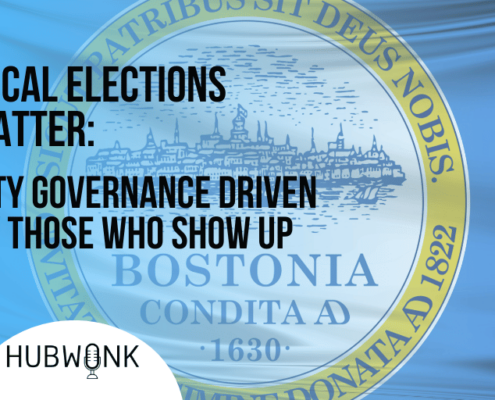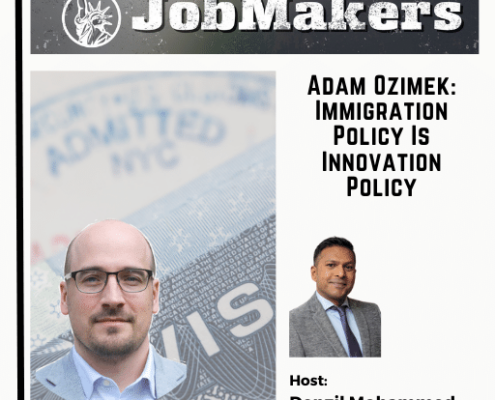
University Science Research Is Under Threat
The Biden administration's formation of a working group to “develop a framework for the implementation of the march-in provision of the Bayh-Dole Act" could have serious adverse consequences for university research and biopharmaceutical innovation. It represents a particularly dangerous threat to the thriving life sciences cluster in Greater Boston.

John Steele Gordon on America’s Economic Rise
This week on The Learning Curve, guest co-hosts Charlie Chieppo and Derrell Bradford interview John Steele Gordon, the author of 10 books on business, economic, and technology history. They discuss the keys to America’s transformation into the world’s foremost economic power and its economic prospects for competitiveness in the twenty-first century.

Farmers Welfare Bill: Rethinking Costly and Environmentally Distortive Subsidies
Joe Selvaggi discusses the cost and consequences of the $1.5 trillion decade-long subsidies in the farm bill with Chris Edwards, Chair of Fiscal Studies at the Cato Institute. These subsidies have the potential to negatively impact incentives for consumers, producers, and those concerned about the environment.

Dr. Ramachandra Guha on Gandhi’s Enduring Legacy
This week on The Learning Curve, guest co-hosts Charlie Chieppo and Mariam Memarsadeghi interview writer and biographer Dr. Ramachandra Guha. The author of the definitive two-volume biography of Mohandas K. Gandhi, Guha discusses Gandhi’s formative educational experiences, spirituality, political leadership, and philosophy of nonviolent resistance.

Predatory Tax Ruling: Supreme Court Closes Door on Home Equity Theft
Joe Selvaggi talks with Pacific Legal Foundation’s state legal policy deputy, attorney Jim Manley, about home equity theft, a practice that has taken 350 properties in Massachusetts, dispossessing homeowners of more than $50 million in equity.

Lousy Healthcare for Thee but Not for Me
In recent years, pharmacy benefit managers (PBMs) have instituted programs to keep out-of-pocket drug costs high for patients. Why is the administration so eager to protect federal employees from high out-of-pocket costs but is perfectly happy for PBMs to enroll millions of other patients in these programs?

Pioneer Study: Adopt Innovative Approaches to Address K-12 STEM Teacher Shortage
States and school districts should look to innovations like endowing science, technology, engineering, and math (STEM) chairs in high schools to address a growing K-12 teacher shortage, according to a new white paper published by Pioneer Institute.

Paul Vallas on Chicago, School Reform, and Teachers’ Unions
This week on The Learning Curve, guest co-hosts Charlie Chieppo and Mary Tamer, executive director of Democrats for Education Reform, Massachusetts, speak with Paul Vallas, former CEO of the Chicago Public Schools and a candidate for mayor of that city earlier this year.

Sweden’s Pandemic Paradigm: Does Trust in Citizenry Save Lives
Joe Selvaggi talks with Johan Norberg, author and senior fellow at CATO Institute, about his analysis of Sweden’s resistance to government-mandated COVID-19 control measures, as well as Sweden’s public health outcomes relative to the U.S and peer nations.

U-Ark. Prof. Albert Cheng on Classical Education & School Choice
This week on The Learning Curve, guest co-hosts Charlie Chieppo and Alisha Searcy speak with Albert Cheng, an Assistant Professor at the Department of Education Reform in the College of Education and Health Professions at the University of Arkansas. Professor Cheng talks about the importance of classical education for guiding educational philosophy and practice and shaping the character of students.

Breast Cancer Risk: Testing to Tailored Screening, Treatment, and Prevention
Joe Selvaggi talks with precision medicine expert, Alva 10 CEO Hannah Mamuszka about how individualized testing can both detect and substantially reduce the incidence of breast cancer, a disease that accounts for more than 40k deaths each year.

Professor Jay Parini on Thirteen Books That Changed America
This week on The Learning Curve, Jay Parini, Professor of English and Creative Writing at Middlebury College, discusses his book Promised Land: Thirteen Books That Changed America, detailing how William Bradford’s Of Plymouth Plantation, The Federalist Papers, and the works of Thoreau, Stowe, Twain, Du Bois, and others have shaped the American mind, character, and identity.

Landlord’s Foreseeable Duty: Who Is Liable When Crime Lands on the Doorstep?
Joe Selvaggi talks with retired Federal Judge Frank Bailey, president of Pioneer Public Interest Law Center, about the Massachusetts Supreme Judicial Court's decision in Hill-Junious v. UTP Realty, LLC, regarding the limits of liability for a landlord when a murder occurs near her tenant’s location, and the challenges facing small entrepreneurs in high-crime communities.

Pioneer Institute Objects to Ballot Petitions on Rent Control and MCAS
Pioneer Institute today filed with Attorney General Andrea Campbell letters expressing opposition to certification of two ballot initiative petitions, one relating to rent control and the other proposing the elimination of MCAS testing as a condition for graduation from a public high school, because both initiative petitions, as drafted, are unconstitutional.

Colossal Academy’s Shiren Rattigan on Microschools and School Choice
This week on The Learning Curve, guest co-hosts Charlie Chieppo and Kendra Espinoza interview Shiren Rattigan of Colossal Academy, a microschool in Florida. They discuss how Shiren became interested in K-12 education and how and why the COVID-19 pandemic led to her founding a microschool.

Trump’s Trial’s Tribulations: Legal Merits of Four Federal Felony Fraud Indictments
Joe Selvaggi talks with legal scholar and George Mason University professor Ilya Somin about the legal merits of the federal indictments against former President Donald Trump and what is likely to come next in the legal proceedings against him and other defendants in the cases involving the aftermath of the 2020 presidential election.

U.K. Cambridge’s Prof. David Abulafia on Oceans, Seas, & Global Trade
This week on The Learning Curve, Professor David Abulafia from Cambridge University discusses the many roles of the world’s oceans in human history and trade. He focuses on how the Pacific, Indian, and Atlantic oceans, along with the Mediterranean Sea, have spurred the rise of civilizations. He concludes with a reading from his book The Boundless Sea: A Human History of the Oceans.

Black Box Budget: Late, Loaded, and Lacking Transparency
Joe Selvaggi talks with Pioneer Institute’s Senior Fellow in Economic Opportunity Eileen McAnneny about the features and flaws of the recently passed 2024 Massachusetts state budget now waiting for Governor Healey’s approval.

Dr. Peter Wood on Diversity and Anger in America
This week on The Learning Curve, Dr. Peter Wood, president of the National Association of Scholars, discusses the invention of the modern concept of diversity, the history of U.S. Supreme Court rulings on the concepts of diversity and race in college admissions, and how a culture of anger seems to pervade American life.

Sabotaging Strategic Success: How Price Controls Could Imperil U.S. Pharma Industry
Joe Selvaggi talks with Pioneer Institute’s Director of Life Sciences Initiative Dr. Bill Smith about the policies that drove biopharmaceutical company from Europe to the U.S., and how proposed, similar price controls in President Biden’s Fair Prices Act could distort incentives away from innovation and threaten the success of a thriving and vital U.S. industry.

UConn’s Prof. Manisha Sinha on The Slave’s Cause: A History of Abolition
This week on The Learning Curve, UConn Professor Manisha Sinha discusses the influential figures and seminal events that created the abolitionist movement. She describes the legacy of the transatlantic slave trade, Harriet Tubman and the Underground Railroad, the passage of the Thirteenth Amendment, and other key moments in the fight to end slavery.

Local Elections Matter: City Governance Driven by Those Who Show Up
Joe Selvaggi talks with Suffolk County Assistant District Attorney and candidate for Boston City Council’s 8th District Montez Haywood about the city council’s role in local governance and the salient issues at stake in the July 25 special election.

Pulitzer Winner Tamara Payne on the Life and Legacy of Malcolm X
This week on The Learning Curve, guest cohosts Alisha Searcy and Mariam Memarsadeghi interview Tamara Payne, award-winning biographer, about Malcolm X. They delve into his early life, rise in the Nation of Islam, civil rights movement involvement, pilgrimage, assassination, and ongoing legacy debate. Ms. Payne concludes with a reading from her book.

Diagnosing Debilitating Debt: Are We Undertaxing or Overspending?
Joe Selvaggi talks with Cato Institute’s Director of Tax Policies, Dr. Adam Michell about the sources of recent record levels of deficits and debt to understand a policy path toward fiscal sustainability that is politically viable.

Johns Hopkins’ Dr. David Steiner on Teaching Wisdom in Schools
This week on The Learning Curve, guest cohosts Charlie Chieppo and Alisha Searcy join Dr. David Steiner for a wide-ranging discussion about the importance of education as a means of transmitting enduring wisdom to young people.

Adam Ozimek: Immigration Policy Is Innovation Policy
The United States is built on all kinds of immigrants with all kinds of skills and experiences. While politicians might have us believe immigration is a divisive issue, the fact is Americans across the political spectrum agree at least on this: High-skilled immigrants are good for the country, and we need more of them.

Court Compels Colorblindness: Harvard Told No Exceptions for Equality Under Law
Joe Selvaggi speaks with Thomas A. Berry of Cato Institute about the Supreme Court’s ruling in Students for Fair Admissions Inc. v. President & Fellows of Harvard College, its impact on affirmative action, and what comes next for colleges seeking to ensure diverse enrollments.

Pulitzer Winner Stacy Schiff on Samuel Adams & American Independence
This week for the Fourth of July, the Learning Curve interviews Pulitzer Prize-winning biographer Stacy Schiff, who explores the American revolutionary Samuel Adams. She discusses Adams’ background, religion, and formative intellectual development, including the influences that Greco-Roman history, the Bible, and Enlightenment thinkers had upon his life and political thought.

Pioneer Study: Every Student Succeeds Act Not Meeting Needs of All Students
The most recent reauthorization of the Elementary and Secondary Education Act makes some progress toward fulfilling the mandate that public school districts provide wide-ranging academic and educational supports to students who attend nonpublic schools, but there is more to be done.

Cara and Gerard on Their Time with The Learning Curve
This week on The Learning Curve, Cara Candal and Gerard Robinson close out their time as long-time cohosts of the podcast by sharing highlights and memories from over the last several years. They reflect upon the state of education reform, the growth of school choice, parental empowerment, the impact of the Great Books, and the wisdom of many well-known and influential guests.
